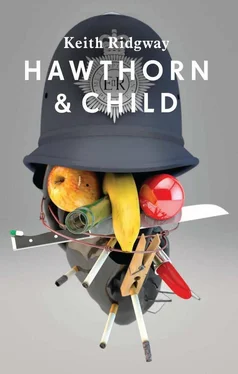He wouldn’t tell her what it was about. He seemed impatient. He wanted to be gone.
— See you Saturday?
— Yeah.
— It’s not about us. Ask your mother what it’s about. She can tell you if she wants. Up to her.
So she had to nag. Her mother was sitting in the kitchen looking at the wall. She had put out mugs but she hadn’t filled them. She didn’t want to talk about it. Cath whined at her. What? What’s going on?
— Someone died.
All Cath’s breathless wondering stopped. And then restarted.
— Who? What happened?
— Misha. You don’t know her. She used to … I was at uni with her.
— What happened?
— I don’t want to, Cath.
And her mother started crying.
She didn’t know what to do. She gave her a sort of hug. She got her a box of tissues. She made a pot of tea. She sat at the table and listened to the story. She caught herself wondering if it was made up. Invented by her mother and father together to warn her of how badly wrong everything could go. Because it was that story. About the pretty, clever girl who everyone knows is going to turn out to be a genius but she starts to drink, and then she meets the wrong people, and she drinks too much, and she starts taking other stuff, and before anyone knows what’s happened she’s living in a junkie squat somewhere in King’s Cross and she’s got a string of arrests and all her old friends and her traumatized parents are really just waiting for the police to show up at the door to say she’s dead. Then she goes away and disappears. She goes to Spain. Years pass. She comes home and she’s OK. She’s sober and she’s done some courses, and everyone thinks that she’s better, she’s through it. She’s not the same, but at least she’s not a mess any more, and even if she is a bit fragile, a bit pathetic, she can hold down a sort of office admin job and she can pay rent and it’s OK. But she’s never what she was. And she’s never what she might have been. And they notice that she’s probably still drinking. Secretly. And eventually — after everyone stops thinking about her and she has become just a sad friend who doesn’t have much of a life and who they never see unless they have to — she hangs herself in her kitchen.
Her mother choked and spluttered on all her guilt and her grief, and she banged the table and cried so loud that Cath was terrified and called her father, but she couldn’t reach him, and left an angry message accusing him of being a heartless bastard . And her mother might have overheard, because she hugged Cath then and told her sorry sorry sorry , she was just so sad. So sad . And she went to bed, and Cath could hear her still, wailing, as if she’d lost everything and had nothing left, not even Cath. And then Cath was crying.
She called Stuart. He wanted to come over but she wouldn’t let him. She tried to be cold about her mother. She tried to tell him that she was being stupid, but he didn’t fall for it, and soon she was crying, and he told her he was coming over, and she told him not to, thank you, but she’d prefer if he didn’t, because it was her mother, her mother’s privacy, and he said OK.
Her dad called. He didn’t say anything about being called a heartless bastard, but he didn’t apologize either. She’s bound to be upset , he said. She’ll be OK . She accused him of not caring. That it was easy for him, it wasn’t his friend who had died. And then he was quiet for a minute and told her that actually it was his friend. That he’d known Misha as long as he’d known her mother. That they’d dated a couple of times. And that he’d seen more of her in the last couple of years than anyone else. Cath apologized, and for no reason that she could understand other than having a dig, her father told her that he loved her.
Then there was someone at the door. It was her mother’s friend Heather, and then everything was OK. Heather gave her a hug, and went up to her mother. Then their other friends Sean and Lillian arrived. And then everyone was in her mother’s bedroom, and coming and going with cups of tea and she even heard laughter.
She called Stuart again. To say sorry. To tell him that everything was OK now. They talked for an hour, each of them lying on their beds. She wrapped his voice around her and made him promise that he wouldn’t let her become a junkie. He laughed. OK, he said. I promise. He thought it was a joke. But she knew they would remember it always, that it was a promise to look after her, and that it was made now and could not be retracted, and that even if they did not stay together there were things between them that would never be between her and anyone else. And that wasn’t being stupid or romantic or saying that it was special or anything. It was just the truth.
She slept late, was late for school. Her mother stayed in bed. Beth nagged at her. Stuart kept an eye on her. Byron asked her was she OK and gave her a hug. She was fine. She was tired. She couldn’t remember most of the things she’d talked to Stuart about. She wondered what he’d said to the others. Whether she came across as needy, weepy, clingy. Those things. She ignored him.
She was still annoyed at her dad.
He closed down when he need to be open. That was what she thought. When there was something wrong he became efficient, busy. He dealt with it. Like a policeman. Like you’d want from a policeman. He would arrive and sort it out. Then he’d leave. And it was sorted. It was fixed. It was a closed case and he was closed and everything was shut off and quiet and finished and he forgot about it.
But when there was nothing wrong he was funny and kind and patient and open.
She thought it through again. She wasn’t sure what she was complaining about.
It was too hot. They took the tube down through London, holding hands and allowing themselves to be pressed against each other. She had a sheen of sweat on her forehead. Stuart was wearing a T-shirt and kept on lifting and flapping the front over his stomach.
They hadn’t been anywhere together for a while. She’d been spending time with her mother, who was still wobbly. She’d sob in front of the television. She’d sit at the kitchen table just staring into space. Cath didn’t know why. Well, she knew why, but she didn’t understand why the grief was so intense. There was something she didn’t know about, she was sure of it. Something more to the story. This Misha. How was it that she had never been spoken of before, and now she was all over Cath’s life, even though she was dead. Nothing, then dead, then everything.
Her father came round a few times. More than he had before. He and her mum would sit in the kitchen chatting quietly. She sometimes sat with them for a while. But it was too weird. They just talked to her, about her, while she was there. So she would go and watch television, or go to her bedroom, and she would hear them murmur together for a long time. Once, after she had gone to bed and fallen asleep, the front door woke her. It was her father leaving. She heard his car start up. It was 4.30 in the morning.
She didn’t know what it was.
She tried to ask her father. He would not help. All he said was that they’d been good friends once, her mother and this Misha. That was it. She wondered whether they’d been lovers or something. She couldn’t imagine it. She wondered whether the three of them had been mixed up in some sort of love triangle thing.
Her father didn’t want to talk about it.
It was cruel. It was unfair. She was the one who had to live with her mother. And for a week now she’d been weird and silent and weepy. The day of the funeral, Cath had come home to find her in bed, still wearing her black dress. She’d had to call Heather again. What was wrong with these people? It was like they forgot she existed. As soon as their own stuff hit them, they forgot about her. She had to fend for herself, knowing nothing.
Читать дальше












